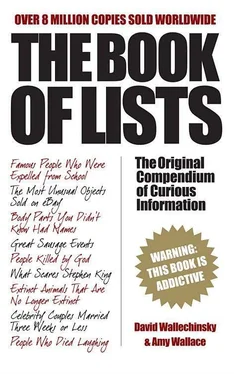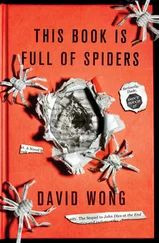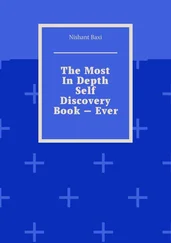IRVING WALLACE’S 9 FAVOURITE AUTHORS
On June 29, 1990 one of the co-authors of The Book of Lists , Irving Wallace, died in Los Angeles at the age of 74. His nearly three dozen books have sold an estimated 200 million copies and have been read by 1 billion people worldwide. He wrote 18 novels, including The Prize, The Man and The Word . Shortly before his death, he compiled a list of his all-time favourite authors.
• W. Somerset Maugham — Of Human Bondage , because of its compelling characterisation, narrative drive, crystal-clear prose; The Summing Up , for clarity, cynicism, philosophy; and The Moon and Sixpence .
• F. Scott Fitzgerald — Tender Is the Night .
• Arthur Koestler — Arrival and Departure and Darkness at Noon .
• Arthur Conan Doyle — the Sherlock Holmes books; pure pleasure, nothing more. Also, The Lost World .
• James Hilton — Lost Horizon and Without Armor .
• Raymond Chandler.
• Graham Greene.
• John le Carré — The Little Drummer Girl .
• Nelson De Mille — Word of Honor and By the Rivers of Babylon .
BRIAN ALDISS’S 10 FAVOURITE SCIENCE FICTION NOVELS
One of the legendary figures in the science fiction genre, Brian W. Aldiss was born in 1925, served with the signal corps in the British Army, then spent nine years as a bookseller before becoming a full-time writer in 1956. His works include Frankenstein Unbound, Moreau’s Other Island and the groundbreaking Helliconia trilogy ( Helliconia Spring, Helliconia Summer, Helliconia Winter ). His short story ‘Supertoys Last All Summer Long’ was a long-time dream project for the legendary director Stanley Kubrick, and was eventually filmed after Kubrick’s death as A.I.: Artificial Intelligence by Steven Spielberg in 2001. A prolific writer, Aldiss lives in Oxford, England, and his most recent novel is Super-State , published in 2003.
• Mary Shelley: Frankenstein or, The New Prometheus
• Albert Robida: The Twentieth Century
• H.G. Wells: The Time Machine
• H.G. Wells: The War of the Worlds
• Olaf Stapledon: Star-Maker
• Charles Harness: The Paradox Men
• Kurt Vonnegut: Galapagos
• Harry Harrison: Bill the Galactic Hero
• Philip K. Dick: Martian Timeslip
• Robert Holdstock: Mythago Wood
WILL SELF’S 9 BOOKS THAT PROVE FACT IS STRANGER THAN FICTION
Land of Opportunity: One Family’s Search for the American Dream in the Age of Crack , William M. Adler (Atlantic Monthly Pr, 1995)
The story of the Afro-American family who brought crack cocaine to Detroit in the early 1980s. A staggering portrayal of the ineluctable convergence between addiction and capitalism in Reagan’s America. At one point the family ran an entire burnt-out office block in downtown Detroit as a crack house, with different floors assigned to differently priced rocks of crack. Their dealers received MacDonalds-style training.
The Strange Last Voyage of Donald Crowhurst , Nicholas Tomalin and Ron Hall (Hodder, 1970)
Crowhurst was the British solo yachtsman who faked his own positions during the 1970 round-the-world yacht race, and then when it became obvious that his subterfuge would be discovered, committed suicide by throwing himself into the sea. In a bizarre echo of the Marie Celeste , Crowhurst’s boat — Teignmouth Electron — was found floating abandoned in the Atlantic, in the cabin was his increasingly disjointed and surrealistic logbook filled with monomaniacal metaphysical speculation.
Into the Wild , Jon Krakauer (Villard Books, 1996)
The tale of a teenage American who walked off into the wilds of Alaska and met his end there. Krakauer links this — surprisingly disturbing — account of a bright young man’s Tolstoyan rejection of bourgeois comfort to a deep and cogent meditation on isolation and the wilderness.
The Origin of Consciousness and the Breakdown of the Bicameral Mind , Julian Jaynes (Houghton Mifflin, 1976)
Not strictly speaking facts at all, a theory, but I believe it. Jaynes’s view is that some time between the composition of the Odyssey and the Iliad the human corpus callosum was formed and the mind became uni-rather than bicameral. In other words, up until comparatively recently when God or gods ‘spoke’ to people, they very much heard him, her or them. Developed with startling erudition, this book will make you look at all forms of religious enthusiasm in an altogether new light.
The Man with a Shattered World , A.R. Luria (Harvard University Press, 1972)
Luria was the pioneering neurosurgeon whose work on the victims of shelling during the Second World War led to startling new insights into the human brain. Because shrapnel wounds tended — where the patient survived at all — to take out localised areas of brain tissue, Luria was able to find an array of individuals with different bits missing. The man of the title had ceased through his injuries to experience the world as a coherent whole. Essential reading for the empiricist, as is Luria’s Mind of a Mnemonist .
The Mountain People , Colin Turnbull (Green Apple Books, 1972)
The story of the Ik, an isolated hill tribe in Kenya, who, when their food supply was destroyed by drought, resolved to starve themselves to death rather than migrate. A compelling depiction of the skull beneath the skin of all human communities and a kind of anthro-pological counterpoint to Primo Levi’s If This is a Man .
Island on the Edge of the World , Charles MacLean (Simon & Schuster, 1972)
By no means the only book on St Kilda, but to my mind the most readable (along with the original account of the islands written by Martin Martin in the seventeenth century — crazy name, crazy guy). St Kilda is the micro-archipelago forty miles to the west of the Outer Hebrides, where a community remained almost completely isolated from the rest of the world for seven hundred years. The St Kildans lived almost entirely on seafowl which they harvested from the towering cliffs of their island fastness. They ate seagulls, exported their feathers, made them into shoes, and smeared fulmar oil on their infants’ umbilici as part of a pagan ritual. During the nineteenth century steamboat cruises were advertised in Liverpool to visit ‘Britain’s Modern Primitives’. The islands were finally evacuated in the 1930s. A remarkable story and one that MacLean tells exceptionally well and with considerable sensitivity.
Whoever Fights Monsters , Robert K. Ressler and Tom Schachtman (St Martin’s Press, 1992)
Ressler is the real life FBI agent that Thomas Harris consulted for the writing of his Hannibal Lecter books, and Ressler’s character undoubtedly informed his portrayal of Jack Crawford, Clarice Starling et al . Ressler was pivotally involved in tracking down most of the serial killers who have preyed on America during the past three decades. His pivotal distinction between ‘organised’ and ‘disorganised’ psychopaths makes for unsettling reading if you have poor impulse control and can’t keep your desk tidy. But on a more serious note, the minute and detailed accounts of scores of disgusting murders, sexual assaults and dismemberments make this the ‘true crime’ book to do away with the rest of them.
Читать дальше












